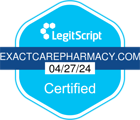
Sponsored article originally shared via Health Evolution on January 26, 2022.
CMS Guidance Affirms Availability of Long-Term Care Pharmacy Services for Patients with Chronic Care Needs
Where and how Americans access healthcare services—including pharmacy care—is evolving faster than ever before. The onset of the COVID-19 pandemic, coupled with industry shifts toward value-based care models, has continued to drive healthcare service delivery to an increasingly popular setting: the patient’s home.
Ninety percent of Americans age 50 and older report they want to continue living at home as they age.1 Add to that a growing number of Americans with chronic conditions, estimated to reach 171 million people by 20302, and the result is a tremendously high volume of people in need of a more comprehensive level of care at home, including support to manage medications.
For many of these patients, a more comprehensive level of pharmacy care, like that provided in a long-term care setting, can help them not only overcome adherence barriers but also attain better health—all while continuing to age in place.
Recent clarifying guidance from the Centers for Medicare and Medicaid Services (CMS) addresses this need and helps to pave the way for the expansion of comprehensive home-based pharmacy models that can provide institutional-level services. This clarifying guidance recognizes the importance of specialized pharmacy services in supporting the health of beneficiaries with complex medical needs and provides guidance to both Medicare FFS and Medicare Advantage plans for enabling member access to this enhanced level of pharmacy support.
Comprehensive Long-Term Pharmacy At Home
Medications are a central component of a patient’s overall plan of care, especially for people who are living with chronic conditions and also likely experiencing polypharmacy.
In fact, nonadherence to drug therapy can cause up to 50 percent of treatment failures and 25 percent of hospitalizations in the United States each year.3 And while 80 percent adherence is considered necessary for optimal efficacy of drug therapy, adherence to medications that treat chronic diseases is estimated to be around 50 percent.3
Many people with chronic conditions who live at home are managing their medications with little support. They may use retail or mail-order pharmacies that provide limited service options, or rely on family caregivers to help them.
A more comprehensive level of pharmacy care, like that provided by long-term care pharmacies, can enable better overall success including improved adherence, reduced admissions and length of stays, and significant total cost of care savings, according to a recent RAND Corporation Study.
Best practices for long-term care at-home pharmacy models include providing a seamless combination of clinical pharmacy services, collaboration with the patient’s healthcare team, and a suite of patient adherence tools. Services may include medication reconciliation, monthly medication reviews, 24/7 access to clinical pharmacy support, refill management, multi-dose adherence packaging, medication delivery, medication reminders and technology-based patient support.
Collaborative partnerships across the patient’s healthcare team, including with health plans, primary care physicians, home health and other providers, are also beneficial to patient success.

An Approach for Better Outcomes
Beyond enabling individual patient success, comprehensive long-term pharmacy at home models can have a notable impact on healthcare outcomes, both clinical and financial.
In fact, a recent study of one such model demonstrated significant impact across several key measures.
The study, conducted by RAND Corporation and published in the Journal of Managed Care + Specialty Pharmacy, reviewed medical and prescription drug encounter data of Medicare Advantage beneficiaries from one of the largest private insurers in the United States. It examined the impact of a high-touch, comprehensive long-term pharmacy at home model for patients with complex medical needs and demonstrated:
- Improved Medication Adherence. Statistically significant increases in adherence to statins and antihypertensive drugs.
- Decreases in Number and Length of Facility Admissions. Statistically significant decreases in skilled nursing facility (SNF) admission rates, SNF days, and inpatient days.
- Reductions in Total Cost of Care. Approximately $2,400 less in total cost of care per patient per year, representing a 5 percent reduction in average costs. And savings ranging up to more than $5,000 per year for patients with the most severe medical concerns.
Results like these demonstrate the significance these types of pharmacy care models can have for stakeholders across the healthcare team—including patients, payers and providers.
As the prevalence of chronic conditions continues to increase, so does the need for continued innovation across all areas of healthcare, including pharmacy. The potential impact of providing long-term care level of pharmacy service to patients in their homes is significant, and represents a new value-based opportunity for plans and providers to collaborate.
- NEARLY 90% OF AMERICANS AGE 50 AND OLDER WANT TO “AGE IN PLACE.” (2021, May 10). Globe News Wire. Retrieved January 3, 2022, from https://www.globenewswire.com/news-release/2021/05/10/2226492/0/en/NEARLY-90-OF-AMERICANS-AGE-50-AND-OLDER-WANT-TO-AGE-IN-PLACE.html.
- The Agency for Healthcare Research and Quality, Multiple Chronic Conditions Research Network. March 2014.
- DiMatteo MR, Giordani PJ, Lepper HS, et al. Patient adherence and medical treatment outcomes: a meta-analysis. Med Care. 2002;40(9):794-811.







